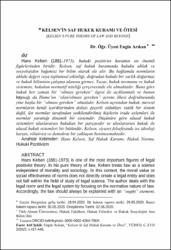| dc.contributor.author | Arıkan, Engin | |
| dc.date.accessioned | 2021-01-08T21:51:34Z | |
| dc.date.available | 2021-01-08T21:51:34Z | |
| dc.date.issued | 2020 | |
| dc.identifier.issn | 1303-4650 | |
| dc.identifier.uri | https://app.trdizin.gov.tr//makale/TXpjeE9EUXhNUT09 | |
| dc.identifier.uri | https://hdl.handle.net/20.500.12846/364 | |
| dc.description.abstract | Hans Kelsen (1881-1973), hukuki pozitivist kuramın en önemli figürlerinden biridir. Kelsen, saf hukuk kuramında hukuku ahlak ve sosyolojiden bağımsız bir bilim olarak ele alır. Bu bağlamda normların ahlaki değeri veya toplumsal etkinliği, doğrudan hukuki bir varlık doğurmaz ve hukuk biliminin çalışma alanına girmez. Yazar, hukuk normunu ve hukuk sistemini, hukukun normatif niteliği çerçevesinde ele almaktadır. Buna göre hukuk her zaman bir “olması gereken” ögesi ile açıklanmalı ve bunun kaynağı da Hume’un “olan/olması gereken” ayrımı ilkesi doğrultusunda yine başka bir “olması gereken” olmalıdır. Kelsen açısından hukuk, mevcut normların kendi içeriklerinden dolayı geçerli oldukları statik bir sistem değil, üst normlar tarafından yetkilendirilmiş kişilerin irade eylemleri ile normlar yarattığı dinamik bir sistemdir. Düşünüre göre ulusal hukuk sistemleri uluslararası hukukun bir parçasıdır ve uluslararası hukuk ile ulusal hukuk sistemleri bir bütündür. Kelsen, siyaset felsefesinde ise ideoloji karşıtı, rölativist ve demokrat bir yaklaşım benimsemektedir. | en_US |
| dc.description.abstract | Hans Kelsen (1881-1973) is one of the most important figures of legal positivist theory. In his pure theory of law, Kelsen treats law as a science independent of morality and sociology. In this context, the moral value or social effectiveness of norms does not directly create a legal entity and does not fall within the field of study of legal science. the author deals with the legal norm and the legal system by focusing on the normative nature of law. Accordingly, the law should always be explained with an “ought” element, and the source of this element should always be another “ought”. This is in line with Hume's principle of “is/ought” gap. From Kelsen's point of view, law is not a static system in which current norms are valid due to their own content, but a dynamic system in which norms are created through acts of will by those individuals who have been authorized by some higher norm. According to the thinker, municipal legal systems are part of international law and international law and municipal legal systems are a whole. Kelsen adopts an anti-ideological, relativist and democratic approach in his political philosophy. | en_US |
| dc.language.iso | tur | en_US |
| dc.rights | info:eu-repo/semantics/openAccess | en_US |
| dc.title | Kelsen’in saf hukuk kuramı ve ötesi | en_US |
| dc.title.alternative | Kelsen’s pure theory of law and beyond | en_US |
| dc.type | article | en_US |
| dc.relation.journal | Yeditepe Üniversitesi Hukuk Fakültesi Dergisi | en_US |
| dc.identifier.volume | 17 | en_US |
| dc.identifier.issue | 2 | en_US |
| dc.relation.publicationcategory | Makale - Ulusal Hakemli Dergi - Kurum Öğretim Eleman | en_US |
| dc.contributor.department | TAÜ, Hukuk Fakültesi, Kamu Hukuku Bölümü | en_US |
| dc.contributor.institutionauthor | Arıkan, Engin | |
| dc.identifier.startpage | 417 | en_US |
| dc.identifier.endpage | 446 | en_US |

















